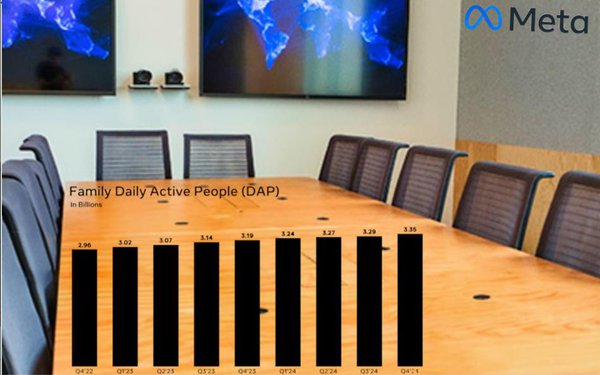
Meta's fourth-quarter
2024 results show the steady growth of a canonical social-media company continuing to expand its active global user base -- most notably on its newest app Threads -- and exceeding expectations in
revenue across its departments least likely to achieve profitability, like its Reality Labs division.
For starters,
Meta increased its number of active users to 3.35 billion across its family of apps in Q4, which marks a 5% increase year-over-year and amounts to almost half of the world’s population.
Threads, the tech giant’s newest social media-platform, experienced a steady rise in users, reaching over 320 million
monthly active users, and adding over 1 million sign-ups per day.
advertisement
advertisement
In a recent statement, Meta CEO Mark Zuckerberg said he expects the microblogging platform and X competitor to reach 1 billion
people over the next several years.
Despite concerns over its relevance to younger audiences, Facebook remains Meta’s most popular platform in most regions. However, this
year, the number of users on Instagram surpassed those on Facebook in Europe.
Expanding its audience across its
family of apps -- which includes Facebook, Instagram, Threads, WhatsApp and Messenger -- gives marketers more opportunities to grow their business with Meta, especially considering the company’s
recent announcement of ads on Threads.
Meta’s revenue also increased in Q4, with the company bringing in $48.39 billion -- an increase of 21% year-over-year.
In total, this brings Meta’s full-year revenue to $164.5 billion, compared to $134.9 billion in 2023.
Overall, 96% of Meta's revenue comes directly from its ad business, although some
departments are starting to contribute to the company’s monetary intake.
Reality Labs, in particular, is beginning to show promise. Although the VR and AR division continues to lose
billions, the department -- which is responsible for Meta's virtual-reality headsets and Ray-Ban Smart Glasses -- exceeded Q4 projections, losing $4.97 billion compared to the expected $5.4 billion
while generating an expected $1.1 billion in sales and resulting in a 40% bump year-over-year.
Meta's Ray-Ban Smart Glasses -- which Zuckerberg has coined as a future replacement for
smartphones -- exceeded sales expectations in 2024, becoming the top-selling glasses brand in 60% of all Ray-Ban stores across Europe, the Middle East, and Africa.
Over the last quarter, Meta
announced integral Ray-Ban updates, including live AI chatbot
accessibility -- which features real-time language translation -- and plans to bring a 3D display to the product.
The company is also planning to release new smart glasses in partnership with sports retailer Oakley later this year,
marketing the technology to specific swaths of consumers.
Since 2020, Reality Labs has suffered an operating loss of over $60 billion. Meta says in its fourth-quarter report that it plans to
invest around $60 billion more in 2025 capital expenditures to expand its AR computing infrastructure.
Meta's commitment to Reality Labs initiatives highlights the company's continued effort
to fuel its long-term metaverse vision and compete with tech giants like Apple with its Orion prototype AR headset -- capable of overlaying digital objects on a person's real field of view -- as well
as its more affordable $299 Quest 3S that launched in September.
While Meta works on growing its social platforms, training its large language models, and developing cutting-edge augmented
reality (AR) and virtual reality (VR) products, the company has also made recent changes to align with President Donald Trump, including the decision to end fact-checking on its social media apps and enforce a Community Notes approach to
content moderation.
Some analysts think this company-wide strategic decision may scare some advertisers away from Meta's platforms. Forrester Vice President and Research Director Mike Proulx
told MediaPost that while Meta “dominated Q4,” the big question is whether advertisers will stick with Meta in Q1 against a backdrop of heightened brand-safety concerns.”
Proulx predicts that “while they might not like it,” advertisers “will continue to spend given Meta's reach and effectiveness.”
Along with its content-moderation
changes, Meta recently agreed to pay $25 million to Trump to settle a
lawsuit over the President's suspension from Facebook following the January 6, 2021 riot in Washington, D.C.